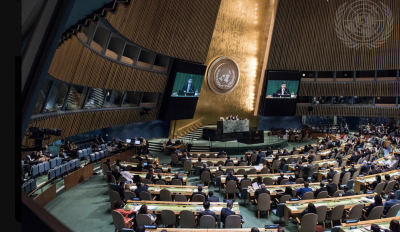
Publication Date:
Briefing for the Universal Periodic Review Pre-Session 47 (2024)
The Coalition on Labor Justice for Migrants in the Gulf is in Geneva this week for the 47th Universal Periodic Review (UPR) pre-session. Qatar is undergoing the UPR process for the fourth time, in which the state’s human rights record is reviewed by other governments, and it subsequently receives recommendations that it must respond to. Coalition member and CEO of Equidem Mustafa Qadri was selected as one of just three civil society representatives from around the world to speak on this week’s civil society panel ahead of Qatar’s review – bringing the unique perspective of migrant workers' voices to a policy process that typically lacks worker engagement.
There are several stages to the UPR, which is a peer review mechanism under the auspices of the UN Human Rights Council that states undergo every five years. First, in the spring, the Coalition submitted a formal report about the conditions faced by migrant workers in Qatar to inform the review process. Now, during the pre-session, civil society organizations such as the Coalition work to influence and shape the recommendations that states provide to Qatar. In November, UN member states will provide their recommendations to Qatar during the UPR Working Group, and in 2025, Qatar will have to publicly accept or reject the recommendations it received at the UN Human Rights Council. The Coalition will be closely monitoring the process.
Our coalition research shows that since its last UPR in 2019, Qatar has demonstrated a weak record of implementing received recommendations, including on existing worker protection laws on recruitment fees and wage theft, as found by coalition research and direct engagement with migrant workers. As a result, migrant workers in Qatar continue to experience significant rights violations – including discrimination, forced labor conditions, and exposure to serious health risks. Combined with barriers to freedom of association, migrant workers face intimidation, threats for reporting violations, and lack remedy and access to justice. In construction, hospitality, security, and domestic and care work, workers report abusive workplace conditions, particularly related to exposure to excessive heat, without proper occupational health and safety precautions.
The Coalition, which was publicly launched in June 2024, is calling for governments and employers to respect the fundamental human and labor rights of migrant workers in the GCC countries throughout their recruitment, migration, employment, and return home. Consistent with its ongoing demands, the Coalition shared recommendations at the pre-session civil society panel event for the Government of Qatar that align with international standards, including recognizing migrant workers’ right to freedom of association, ensuring equal pay for equal work, and protection from recruitment fees, among others.
Publication Type:
- Report